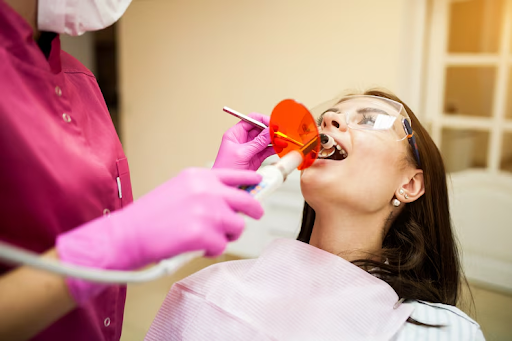Sedation dentistry, also known as sleep dentistry, offers a solution for patients who experience anxiety or fear related to dental procedures. This practice has gained popularity recently, making dental visits more manageable and comfortable for those who may otherwise avoid essential oral care. Here, we will explore the various types of sedation dentistry, its benefits, safety considerations, and its role in promoting better dental health.
What is Sedation Dentistry?
Unlike general anesthesia, which makes patients fully unconscious, sedation dentistry allows them to remain awake but in a deeply relaxed state. This approach is particularly beneficial for those with dental phobia, requiring extensive dental work, or struggling to sit still in the dentist’s chair.
Types of Sedation Dentistry
There are several types of sedation used in dentistry, each varying in depth of sedation and method of administration:
- Nitrous Oxide (Laughing Gas): This is the most common form of sedation dentistry. Nitrous oxide is inhaled through a mask, producing a calming effect within minutes. Patients remain awake and can respond to the dentist in Reston, VA, but they often feel relaxed and may even feel a sense of euphoria. The effects wear off quickly after the mask is removed, allowing patients to drive themselves home.
- Oral Sedation: In this method, patients take an oral sedative before their appointment. The dosage can vary, allowing dentists to adjust the level of sedation based on individual needs. Patients remain awake but may feel drowsy and less aware of the procedure. Unlike nitrous oxide, the effects of oral sedation can take longer to wear off, so patients may need someone to drive them home.
- IV Sedation: This form of sedation is administered through an intravenous line, providing a deeper level of sedation. IV sedation allows for quick adjustments during the procedure, ensuring that patients remain comfortable. Patients typically have little to no memory of the procedure afterward. Due to its depth, IV sedation is often reserved for more invasive procedures or patients with severe anxiety.
- General Anesthesia: In some cases, general anesthesia may be necessary. This method involves rendering the patient completely unconscious and is typically used for extensive surgeries or in patients who cannot tolerate dental procedures awake. General anesthesia requires careful monitoring and is usually performed in a hospital or surgical center.
Benefits of Sedation Dentistry
- Increased Comfort: Patients can undergo longer procedures without discomfort or pain, as sedation keeps them relaxed and pain-free.
- Enhanced Cooperation: Sedation can make it easier for patients to follow instructions, making the dentist’s job easier and more efficient.
- Reduced Gag Reflex: The gag reflex can interfere with dental work for some patients. Sedation can help minimize this issue, allowing for smoother procedures.
- Faster Recovery: Many forms of sedation, especially nitrous oxide, have minimal recovery times, allowing patients to return to their normal activities quickly.
Safety Considerations
While sedation dentistry is generally safe, individual health factors must be considered. Before undergoing sedation, patients should discuss their medical history, current medications, and any allergies with their dentist. Dentists are trained to assess the suitability of sedation methods based on individual patient needs.
Moreover, having someone accompany the patient to and from the appointment is crucial, especially when using oral or IV sedation. This ensures safety during the recovery phase when patients may still feel drowsy.
If you are considering sedation dentistry, consult with your dentist in Reston, VA, to determine the best approach for your needs. You can overcome dental anxiety and take charge of your oral health with the right support and care. Whether through nitrous oxide, oral sedation, IV sedation, or general anesthesia, sedation dentistry can help patients maintain better oral health and enjoy a positive dental experience.
Conclusion
Sedation dentistry is an invaluable tool for making dental care accessible and comfortable for those who may feel anxious or fearful about dental procedures. By providing various sedation options tailored to individual needs, dentists in Reston, VA, can ensure patients receive the care they need without the associated stress.








